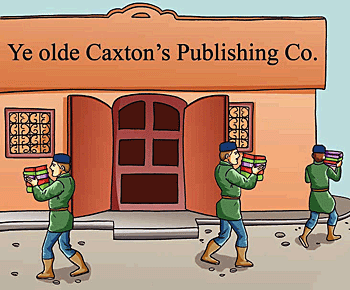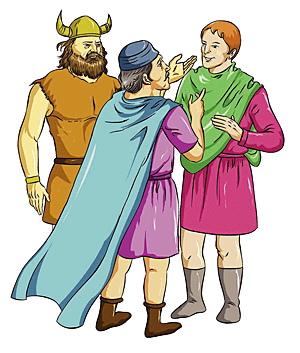English and Its Historical Development, Part 22
(Modern English Period)
The Modern-English Period is dated from A.D. 1500 to the present

The invention of the printing press expanded education, communications, and the awareness of social problems which resulted in a new epoch of universal knowledge and interests.
The Renaissance, 1500-1650



The Renaissance was a revival of classical literature; the purifying of Latin diction and grammar, the revival of Greek, and a return from Middle Age compilation to the old classical texts.
Italian humanists from 1393 onward went to Constantinople to learn Greek and brought Greek manuscripts back with them.
The next wave of innovation in English came with the Renaissance
The revival of classical scholarship brought many classical Latin and Greek words into the Language.
These borrowings were deliberate and many bemoaned the adoption of these "inkhorn" terms, but many survive to this day. Shakespeare's character Holofernes in Loves Labor Lost is a satire of an over enthusiastic schoolmaster who is too fond of Latinisms.
Many students having difficulty understanding Shakespeare would be surprised to learn that he wrote in "modern English"; but, as can be seen in an example of the Lord's Prayer, Elizabethan English has much more in common with our language today than it does with the language of Chaucer.
Many familiar words and phrases were coined or first recorded by Shakespeare, some 2,000 words and countless catch-phrases are his.
Newcomers to Shakespeare are often shocked at the number of cliches contained in his plays, until they realize that he coined them and they became cliches afterwards. "One fell swoop," "vanish into thin air," and "flesh and blood" are all Shakespeare's. Words he bequeathed to the language include "critical," "leapfrog," "majestic," "dwindle," and "pedant."
Two other major factors influenced the language and served to separate Middle and Modern English
The first was the Great Vowel Shift. This was a change in pronunciation that began around 1400.
While modern English speakers can read Chaucer with some difficulty, Chaucer's pronunciation would have been completely unintelligible to the modern ear.
Shakespeare, on the other hand, would be accented, but understandable. Long vowel sounds began to be made higher in the mouth and the letter "e" at the end of words became silent. Chaucer's Lyf (pronounced "leef") became the modern life.
In Middle English "name" was pronounced nam-a, "five" was pronounced feef, and "down" was pronounced doon. In linguistic terms, the shift was rather sudden, the major changes occurring within a century.
The shift is still not over, however, vowel sounds are still shortening although the change has become considerably more gradual.

The Renaissance resulted in a demand for translations of Greek and Latin literature, but the translators could not find sufficient words in English to express the deeper literary and philosophical concepts of the classical writers.
Here are various versions of a familiar text to see the differences between Old, Middle, and Modern English.
Take for example, this Old English (c.1000) sample:
si þin nama gehalgod tobecume þin rice gewurþe þin willa on eorðan swa swa on heofonum
urne gedæghwamlican hlaf syle us to dæg
and forgyf us ure gyltas swa swa we forgyfað urum gyltendum
and ne gelæd þu us on costnunge ac alys us of yfele soþlice.
Rendered in Middle English (Wyclif, 1384), the same text is recognizable to the modern eye:
þi reume or kyngdom come to be. Be þi wille don in herþe as it is dounin heuene.
yeue to us today oure eche dayes bred.
And foryeue to us oure dettis þat is oure synnys as we foryeuen to oure dettouris þat is to men þat han synned in us.
And lede us not into temptacion but delyuere us from euyl.
Finally, in Early Modern English (King James Version, 1611) the same text is completely intelligible:
Thy kingdom come. Thy will be done in earth as it is in heauen.
Giue us this day our daily bread.
And forgiue us our debts as we forgiue our debters.
And lead us not into temptation, but deliuer us from euill. Amen.

As a result of the many translated books, Greek and Latin were assimilated into English through writing, not by conversation as were the Scandinavian and French languages.
There was a strong opposition to something called "inkhorn terms"
Another great invasion of England was accomplished by Greek and Latin words which have become a permanent part of the English language. Some English "purists" called this classical invasion "Inkhorn Terms". In fact, some of them strongly expressed: "Down with inkhorn terms, up with good old Anglo-Saxon English!"
The phrase “inkhorn term” came into English in the early to middle sixteenth century, with the first attested usage dating from 1543 and referred to "invented words" almost exclusively from classical Latin and Greek origins.
It was from the beginning a term of "gentlemanly abuse", referring to words which were being used by scholarly writers but which were unknown or uncommon in ordinary speech.
The word derives from the then standard name for the container in which ink was stored, originally made from a real horn; later, when this term had itself become obsolete, it was sometimes rendered as "inkpot term".
The objection to inkhorn terms was primarily against the sudden increase in English vocabulary derived from classical sources which was taking place at this time.
Writers were experimenting with the language, importing and inventing terms to meet their needs; especially, because of the need for terms to describe new technologies.
The greater number of these new words were borrowed from Latin, but they were not exclusively drawn from that source. Some were taken from Greek, a great many from French, and not a few from Italian and Spanish.
Although many of their inventions and adaptations proved unsuccessful, large numbers of others did gain a permanent place and are still in use today.
Whatever the reason for the success or failure of new words, the period of inventiveness and adaptation enriched English with thousands of new terms and the process continues in our modern-English era.
American English
Also significant beginning around 1600 AD was the English colonization of North America and the subsequent creation of a distinct American dialect. Some pronunciations and usages "froze" when they reached the American shore.
In certain respects, American English is closer to the English of Shakespeare than modern British English is.
Some "Americanisms" that the British criticize are actually originally British expressions that were preserved in the colonies while lost at home; such as, fall as a synonym for autumn, trash for rubbish, frame-up which was reintroduced to Britain through Hollywood gangster movies, and loan as a verb instead of lend.
The American dialect also served as the route of introduction for many native American words into the English language
Most often, these were place names like Mississippi, Roanoke, and Iowa. Indian-sounding names like Idaho were sometimes created that had no native-American roots; but, names for other things besides places were also common.
Raccoon, tomato, canoe, barbecue, savanna, and hickory have native American roots, although in many cases the original Indian words were mangled almost beyond recognition.
Spanish has also been great influence on American English. Armadillo, mustang, canyon, ranch, stampede, and vigilante are all examples of Spanish words that made their way into English through the settlement of the American West.
To a lesser extent French, mainly via Louisiana, and West African, through the importation of slaves, words have influenced American English.
Armoire, bayou, and jambalaya came into the language via New Orleans. Goober, gumbo, and tote are West African borrowings first used in America by slaves.
At least half of all business deals in the world are estimated to be conducted in English. Two thirds of all scientific papers are written in English.
Over seventy percent of all mail, is written and addressed in English. Most international tourism and aviation is conducted in English.
Proceed to Part 23, English writers used Latin and Greek.
INDEX or Table of Contents, English and its historical development.
References: sources of information.
